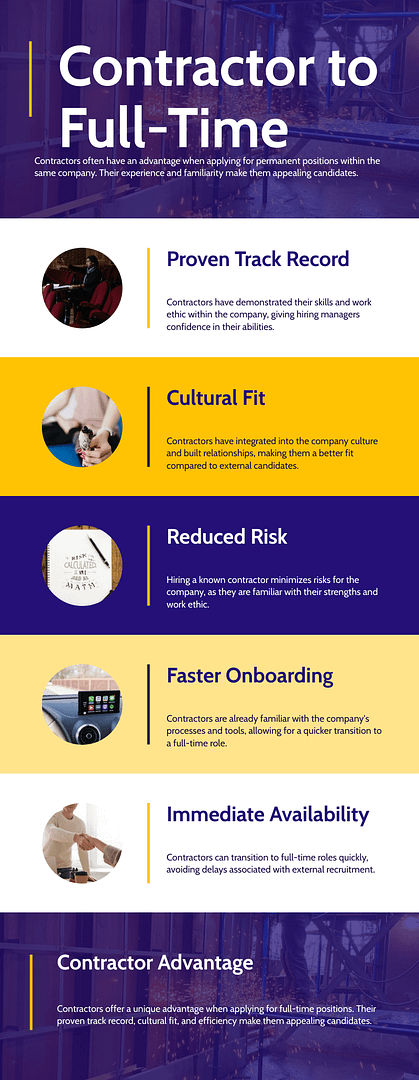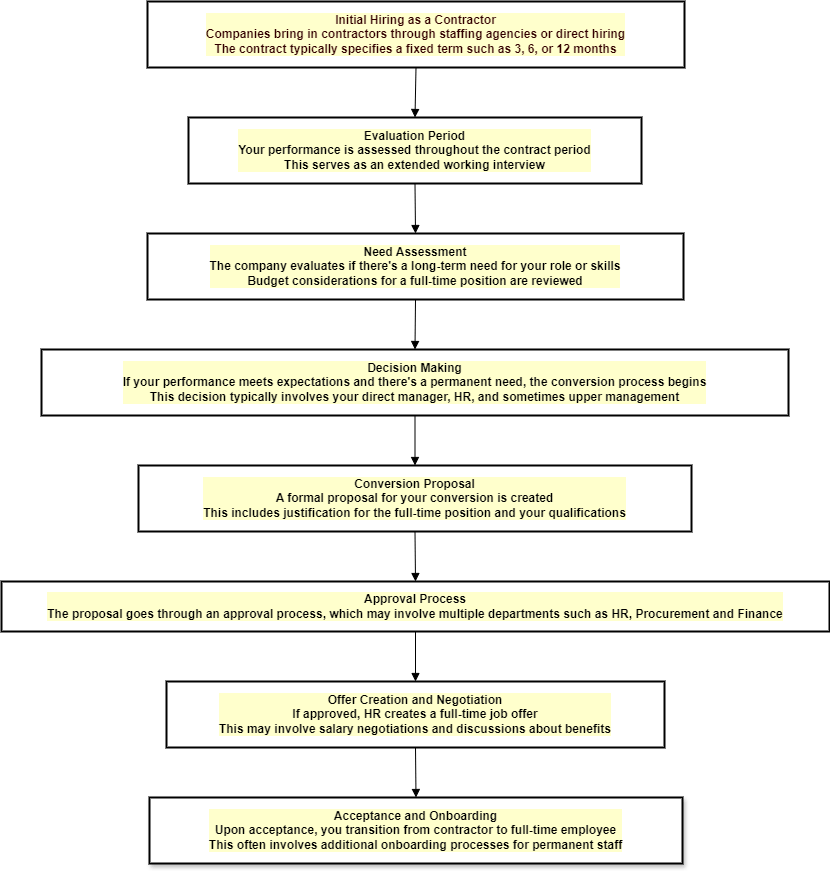How Contract Jobs Can Increase Your Chances of Getting a Full-Time Permanent Position!

Introduction
In today’s job market, finding a full-time Permanent Position can feel like searching for a needle in a haystack. With economic fluctuations and companies becoming more cautious about hiring, job seekers face significant challenges. But what if I told you that there is a strategic way to navigate these hurdles and secure that coveted full-time role. Enter contract jobs.
Many job seekers question whether working Contract Jobs to find Full-time permanent employment is a viable pathway. YES! THEY ARE! Please read on.
In my long career as a Talent Acquisition Executive for global companies, I have had the opportunity to hire thousands of contractors and work with internal company stakeholders and staffing agencies to convert a significant number of them into permanent employees.
In this comprehensive guide, I will share with you my experience and insights from across industries about how contract jobs can increase your chances of landing a full-time position. We will discuss everything you need to know about contractor conversions in companies and how you can prepare for it.
Table of contents:
- Understanding Contract Jobs
- Why Do Companies Sometimes Hire Contractors Instead Of Full-Time Employees?
- Why Contract Job Can Lead To a Full-time Permanent Position?
- What Industries are likely to convert a Contractor to Full-time Permanent position?
- What Roles Are Suited for Conversion from Contract to Full-Time Permanent Positions?
- At What Levels Do These Contractor Conversions Happen?
- How Can Contract Jobs Improve Your Chances of landing a Permanent role?
- Why companies may prefer to convert Contractors to Permanent Staff vs. sourcing External Candidates?
- How do you Leverage your tenure as a Contract Worker to prepare for a Full-Time Permanent Position?
- How Does the Contract-to-Hire Process Work in a Company?
- How Is Compensation Determined During Conversion of a Contractor to a Full-Time position?
- Conclusion
- FAQs
Understanding Contract Jobs
What Are Contract Jobs?
Contract jobs are temporary positions where an individual is hired for a specific period or project. Unlike full-time roles, contract jobs have a defined end date, which can range from a few weeks to several months. These roles are often used by companies to meet short-term needs or to bring in specialized skills for specific projects.
Interim Employees, Contractors, And Consultants: What’s the Difference?
While these terms are often used interchangeably, there are subtle differences:
- Interim Employees: These are temporary employees who fill in for permanent staff during absences or transitions.
- Contractors: Contractors are brought in for specific projects or to provide specialized skills. They may work through staffing agencies or as independent contractors.
- Consultants: Consultants are experts brought in to provide specialized advice or services. They often work on a project basis and may be part of a consulting firm or operate independently, often working with multiple clients simultaneously.
Different Terminologies And What They Mean?
- Temp to Perm: A temporary position that has the potential to become permanent based on performance and company needs.
- Temp to Hire: Similar to temp to perm, this refers to a temporary role that could lead to a full-time permanent offer.
- Contract to Hire: A contract position with the possibility of transitioning to a full-time permanent role after a trial period.
- Contract to Permanent: Another term for contract to hire, indicating the potential for a permanent position.
- Contractor Conversion: The process of transitioning a contractor to a full-time employee.
- Full time Positions: positions where the person works full time hours – typically 2048 hours a year or more. You can work full time both as a contract employee or a permanent employee.
- Part time Positions: positions where the person works Part time hours based on their own preference or business need. You can work Part-time both as a contract employee or a permanent employee.
Differences Between Contract Jobs and Full-Time Permanent Positions
Here are the differences between contract jobs and full-time permanent positions
| Aspect | Contract Jobs | Full-Time Positions |
| Duration | Temporary with a set end date. | Ongoing with no defined end date. |
| Benefits | Generally do not receive company benefits. | Receive benefits like health insurance, paid time off, and retirement plans. |
| Job Security | Temporary by nature; less job security. | More job security due to ongoing employment. |
| Flexibility | Often more flexible in terms of work hours and location. | Typically less flexible; standard work hours and location. |
| Purpose | Address short-term needs or specific projects. | Fulfill long-term roles and responsibilities. |
Why Do Companies Sometimes Hire Contractors Instead Of Full-Time Employees?
Companies hire contract workers for several reasons:
- Flexibility: It allows businesses to scale their workforce up or down based on project needs.
- Cost-Effectiveness: Hiring contractors can be more cost-effective, especially for short-term projects.
- Specialized Skills: Contractors often bring niche skills that might not be needed on a full-time basis.
- Trial Period: It provides an opportunity for companies to evaluate a worker before considering them for a permanent role.
- Immediate Needs: Contract workers can fill immediate staffing gaps without the long-term commitment of a full-time hire.
Why Contract Job Can Lead To a Full-time Permanent Position?
Now that you understand what contract jobs are, let me share with you why they can be an effective pathway to full-time employment. Here are the several factors at play that make contract-to-hire arrangements appealing for both employers and job seekers.
Please note that for the purpose of this article I will be using the terms contractors to also include interims, temporaries and consultants as the principles and strategies to get converted are the same. We will also use the term “Full-time Positions” to denote “Permanent Positions”.
Company’s Co-Employment Concerns
One of the key reasons contract jobs can lead to full-time positions is due to companies’ concerns about co-employment. Co-employment occurs when both the staffing agency and the client company share control over the contractor’s work and employment conditions. This can create legal and tax implications, especially if a contractor works for the same company for an extended period.
To mitigate these risks, companies often start evaluating the tenure of contractors who have been with them for more than 12 months. If a contractor is doing well, the company may decide to offer a full-time position to avoid the complexities of co-employment and to retain valuable talent.
In all the companies I worked with it was a common practice to review a report of all contractors working in the company across divisions every month to see who is crossing the established threshold and how that needs to be handled.
Changes in Business Needs Necessitating Immediate Hire
Business needs are rarely static. A company might initially require a contractor for a specific project or duration, but circumstances can change rapidly. Some scenarios include:
- Unexpected growth in a particular department
- New projects or clients requiring additional permanent staff
- Reorganization leading to new full-time positions
When we faced those scenarios in the companies I worked, we would often look to our existing contractor pool first when filling new permanent positions. Why? Because these contractors are already familiar with the company’s culture, processes, and expectations.
Contract Jobs Serving as a Testing Process for Talent
Perhaps the most significant reason contract jobs can lead to full-time positions is that they serve as an extended interview process. This arrangement benefits both parties:
For employers:
- Helps assess a worker’s skills in real-world scenarios
- Allows evaluation of cultural fit over an extended period
- reduces the risk of making a poor hiring decision
For job seekers:
- Allows you to showcase your abilities beyond what’s possible in a traditional interview
- You can prove your value to the organization
- Figure out if the company and role are a good fit for your long-term career goals
American Staffing Association. (2019). Staffing Industry Statistics. https://americanstaffing.net/staffing-research-data/fact-sheets-analysis-staffing-industry-trends/staffing-industry-statistics/ This statistic underscores the potential of contract work as a stepping stone to full-time employment.
The “Try Before You Buy” Mentality
Lot of companies including mine adopted a “try before you buy” approach when it came to hiring. In my experience, this mentality is particularly prevalent in industries with high turnover rates or where the cost of a bad hire is significant. By starting with a contract arrangement, both us as an employer and the employee could ensure that there was a good match before committing to a long-term relationship.
Bridging Skills Gaps
In today’s rapidly evolving job market, companies often face skills gaps in their workforce. Contract positions allow organizations to bring in specialized talent to address immediate needs while also providing an opportunity to transfer knowledge to existing staff. If the contractor proves to be a valuable asset, the company may decide to retain them full-time to continue benefiting from their expertise.
What Industries are likely to convert a Contractor to Full-time Permanent position?
While contract-to-permanent conversions can happen in any industry, some sectors convert more than others. Understanding which industries frequently convert contractors can help you target your job search more effectively. Below is an illustrative list:
Technology and IT
The tech industry is known for its high rate of contractor conversions. According to a report by Staffing Industry Analysts, IT staffing accounts for 36% of the total staffing market revenue in the United States. This significant percentage indicates a high demand for contract workers in this field, many of whom transition to permanent roles.
Reasons for high conversion rates in tech:
- Rapid industry growth and constant need for talent
- Project-based work that can evolve into long-term needs
- Opportunity to assess specialized skills in real-world scenarios
I have led the recruiting function in multiple industries. IT is one area where I had to always bring in contractors because of unique skill requirements and urgent need and had to convert more than 30% of those later to permanent roles.
Healthcare
The healthcare sector, particularly in areas like nursing and allied health professions, frequently uses contract-to-hire arrangements. A study by AMN Healthcare found that 80% of healthcare facilities use temporary staff, with many viewing it as a path to permanent employment.
Factors contributing to conversions in healthcare:
- Ongoing shortage of healthcare professionals
- Need to evaluate caregivers’ skills and bedside manner
- Regulatory compliance and patient safety concerns
Finance and Accounting
Financial services and Accounting firms often bring in contractors during busy seasons (like tax season) or for specific projects. Many of these temporary roles have the potential to become permanent.
Reasons for conversions in finance:
- Cyclical nature of work allows evaluation over peak periods
- Need for professionals who understand company-specific financial systems
- Regulatory changes requiring long-term specialized knowledge
Manufacturing and Engineering
The manufacturing sector, particularly in specialized engineering roles, frequently uses contract-to-hire arrangements. A report by the National Association of Manufacturers showed that 67.9% of manufacturers create new positions for full-time employment from their contract workforce.
Factors driving conversions in manufacturing:
- Project-based nature of many engineering roles
- Need to assess technical skills in specific manufacturing environments
- Opportunity to evaluate safety practices and adherence to protocols
In my role leading the Talent Acquisition function for a large manufacturing company in Michigan with 10 plants, we were bringing in more than 1000 Light Industrial and Engineering staff on a contract basis per year.
Creative and Marketing
The creative industry, including advertising, design, and digital marketing, often starts with project-based contract work that can lead to full-time positions.
Reasons for conversions in creative fields:
- Need to evaluate creative fit with company brand and style
- Project success often leads to expanded work and permanent needs
- Opportunity to assess both technical skills and creative problem-solving abilities
Typical Conversion Rates by Industry
| Industry | Conversion Rate |
| Technology | 30% – 50% |
| Healthcare | 25% – 40% |
| Finance | 20% – 40% |
| Marketing and Advertising | 25% – 35% |
What Roles Are Suited for Conversion from Contract to Full-Time Permanent Positions?
While contract-to-hire opportunities can exist in almost any position, certain roles are more commonly converted from temporary to permanent status. Understanding this can help you evaluate your chances more effectively and strategize appropriately if you’re aiming for a full-time permanent position through contract work.
IT and Software Development
- Software Developers: Companies often bring in contract developers for specific projects, which can lead to permanent roles if the need continues.
- IT Project Managers: As projects evolve, temporary project managers may be offered permanent positions to oversee long-term initiatives.
- Data Analysts and Scientists: With the growing importance of data-driven decision making, these initially project-based roles frequently transition to full-time.
Healthcare
- Nurses: Travel nurses or temporary staff often have opportunities to convert to permanent roles, especially in understaffed facilities.
- Medical Coders and Billers: These professionals may start as contractors during busy periods and transition to full-time as their value becomes apparent.
- Healthcare IT Specialists: As healthcare systems continually upgrade their technology, these initially temporary roles often become permanent.
Finance and Accounting
- Accountants: Many firms hire temporary accountants during tax season, with the potential for permanent conversion for top performers.
- Financial Analysts: Companies may bring in contract analysts for specific projects, leading to full-time roles if they demonstrate exceptional skills.
- Auditors: Temporary auditors who prove their worth during busy seasons may be offered permanent positions.
Marketing and Creative
- Content Writers: Often hired for specific campaigns, skilled writers may transition to full-time roles managing ongoing content needs.
- Graphic Designers: Project-based design work can evolve into permanent positions for those who align well with the company’s brand and style.
- Digital Marketing Specialists: As digital strategies prove successful, contract specialists may be brought on full-time to manage ongoing campaigns.
Human Resources
- Recruiters: Companies may hire contract recruiters during high-growth periods, with the potential for permanent roles as hiring needs stabilize.
- HR Generalists: Temporary HR support during busy periods or for specific initiatives can lead to full-time positions.
Engineering and Manufacturing
- Quality Assurance Specialists: Initially brought in for specific product launches or improvements, these roles often transition to permanent to maintain ongoing quality standards.
- Process Engineers: Contract engineers who successfully optimize processes may be offered full-time roles to continue improvement initiatives.
Customer Service and Support
- Customer Service Representatives: Companies may use temporary staff to handle seasonal influxes, with top performers being offered permanent positions.
- Technical Support Specialists: As products or services evolve, temporary support staff may transition to full-time roles to provide ongoing expertise.
Administrative and Clerical
- Executive Assistants: Initially hired for temporary support, skilled assistants often transition to permanent roles as they prove their value.
- Office Managers: Temporary office managers brought in during transitions or expansions may be offered full-time positions if they excel.
Sales
- Sales Representatives: Companies might use a contract-to-hire approach to test a salesperson’s abilities before offering a permanent position with more substantial commission structures.
At What Levels Do These Contractor Conversions Happen?
Contractor conversions can occur at various levels within an organization, from entry-level positions to senior roles. Understanding where these conversions typically happen can help you target your job search more effectively..
Entry-Level Positions
Contractor conversions often occur at the entry-level, where companies bring in fresh talent to handle specific tasks or projects and convert if they perform. Common entry-level roles that see high conversion rates include:
- Junior Software Developers
- Marketing Assistants
- Administrative Assistants
- Customer Support Representatives
Mid-Level Positions
Mid-level positions are another common area for contractor conversions: A study by Staffing Industry Analysts found that 58% of companies convert mid-level contractors to full-time employees within a year.
Examples of mid-level roles suited for conversion include:
- Project Managers
- Financial Analysts
- Human Resources Specialists
- IT Support Specialists
Senior-Level Positions
While less common, contractor conversions can also happen at the senior level. According to a report by BlueSteps, 15% of executive-level hires started as contractors or interim leaders.
Senior-level roles that might see conversions include:
- Interim CFOs
- Senior Software Engineers
- Marketing Directors
- Operations Managers
- Consultants to Executive Transitions
How Can Contract Jobs Improve Your Chances of landing a Permanent role?
Starting with a contract job can be a strategic move for you, especially in a competitive job market. Here are some key benefits of joining a company in a contract role if you are interested in a permanent role in future:
- Foot in the Door: Contract jobs provide an opportunity to get your foot in the door at reputable companies. This can be particularly advantageous if you’re trying to break into a new industry or company.
- Showcase Your Skills: As a contractor, you have the chance to demonstrate your skills, work ethic, and ability to contribute to the company’s success. This visibility can significantly increase your chances of being considered for a full-time role.
- Gain Diverse Experience: Contract roles often expose you to various projects and tasks, allowing you to gain a wide range of experiences. This can make you more versatile and attractive to future employers.
- Higher Pay Potential: Contract jobs can sometimes offer higher pay rates compared to entry-level full-time positions. This is because contractors are often compensated for their specialized skills and the temporary nature of their work.
- Flexibility: Contract roles often come with more flexible work arrangements, which can be beneficial if you need a better work-life balance or if you’re juggling multiple commitments.
Why companies may prefer to convert Contractors to Permanent Staff vs. sourcing External Candidates?
Understanding the benefits of contract work for you is just the first step. Now, let’s explore how companies view contractor conversions and why they often prefer to hire from their existing pool of contract workers.
The Company’s Perspective: Why Convert a Contractor to a Full-time position?
Companies have a vested interest in converting high-performing contractors to save time, money, and energy vs. looking at external applicants:
- Reduced Hiring Risks: Companies have already seen your work firsthand, reducing the risk of a poor hiring decision. According to a study by the Society for Human Resource Management, the average cost of a bad hire can be up to five times the employee’s annual salary which can be avoided by companies converting contractors.
- Cost-Effective Recruitment: According to SHRM’s Human Capital Benchmarking Report, average cost-per-hire for companies is $4,129. Converting a contractor eliminates many this recruitment cost. In addition, companies also save on training expenses. Training a new employee can cost up to 30% of their first year’s salary..
- Faster Onboarding: Contractors-turned-employees require less training and onboarding time, leading to quicker productivity. A study by Allied HR IQ found that it takes an average of 8 months for a newly hired employee to reach full productivity.
- Cultural Fit Assurance: Companies can be confident that converted contractors already fit well within the organizational culture.
- Retention Benefits: Employees who start as contractors often have higher job satisfaction and longer tenure. LinkedIn’s data shows that internal hires, including converted contractors, stay 41% longer than external hires.
- Time Savings: The average time-to-hire for external candidates is 42 days, according to SHRM. Converting a contractor can significantly reduce this timeframe.
- Energy Conservation: The hiring process is resource-intensive. Converting a known entity allows companies to focus energy on other priorities.
- Knowledge Retention: Contractors often develop valuable, company-specific knowledge. Converting them retains this intellectual capital within the organization.
- Team Dynamics: Existing contractors have already integrated into team dynamics, reducing disruption compared to bringing in an external hire.

How do you Leverage your tenure as a Contract Worker to prepare for a Full-Time Permanent Position?
Now that we understand the benefits of contract work and why companies convert contractors, let’s explore strategies to maximize your chances of transitioning from a contract role to a permanent position.
1. Evaluate Your Chances of Conversion Before Accepting the Role
Before you even start a contract position, it’s crucial to assess the potential for conversion:
- Ask About Conversion History: Inquire about the company’s track record of converting contractors to full-time employees.
- Understand the Company’s Growth Plans: A growing company is more likely to have permanent positions opening up.
- Clarify the Contract Terms: Ensure your contract doesn’t have clauses that might hinder conversion (e.g., non-compete agreements).
2. Ensure a “Contract-to-Hire” Clause Exists
When negotiating your contract, work with your staffing agency to include a “contract-to-hire” clause in their agreement with the client. This clause should:
- Specify the possibility of conversion to a permanent role
- Outline any fees or processes involved in the conversion
- Avoid major restrictions that could prevent your transition to a full-time role
3. Excel in Your Contract Role
Your performance during the contract period is crucial. Focus on:
- Exceeding Expectations: Go above and beyond your assigned tasks.
- Reliability: Be punctual, meet deadlines, and maintain a strong work ethic.
- Problem-Solving: Take initiative in identifying and solving problems.
According to a survey by Robert Half, 65% of senior managers said work quality is the most important factor when considering a temporary worker for a permanent role
4. Build Relationships and Network Within the Company
Networking is key to increasing your visibility and chances of conversion:
- Connect with Team Members: Build positive relationships with your colleagues.
- Engage with Leadership: Seek opportunities to interact with managers and executives.
- Participate in Company Events: Attend team-building activities and social events when possible.
5. Learn About the Company’s Needs Quickly
Understanding the company’s challenges and goals can help you position yourself as a valuable asset:
- Stay Informed: Keep up with company news and industry trends.
- Identify Pain Points: Look for areas where you can contribute beyond your current role.
- Align Your Skills: Highlight how your skills address the company’s specific needs.
6. Become Indispensable
Make yourself an integral part of the team:
- Develop Unique Skills: Learn skills that are particularly valuable to the company.
- Take on Additional Responsibilities: Volunteer for tasks outside your immediate job description.
- Document Your Achievements: Keep track of your contributions and positive impact.
7. Express Interest in Full-Time Opportunities
Don’t assume your desire for a permanent role is known:
- Communicate Your Goals: Express your interest in a full-time position to your manager or HR representative.
- Ask About the Process: Inquire about the steps involved in transitioning from contract to permanent.
- Follow Internal Job Postings: Apply for relevant permanent positions that open up.
8. Treat Your Contract Period as an Extended Interview
Remember that you’re constantly being evaluated:
- Maintain Professionalism: Always present yourself as if you’re interviewing for a permanent role.
- Showcase Your Cultural Fit: Demonstrate that you align with the company’s values and culture.
- Be a Team Player: Show your ability to collaborate effectively with others.
9. Seek Feedback and Act on It
Proactively seek ways to improve:
- Request Regular Check-ins: Ask for feedback from your manager or team lead.
- Act on Suggestions: Quickly implement any suggested improvements.
- Show Growth: Demonstrate your ability to learn and adapt.
10. Prepare for the Transition
As your contract nears its end, prepare for a potential transition:
- Update Your Resume: Include your achievements from the contract role.
- Gather Recommendations: Ask for letters of recommendation from colleagues or supervisors.
- Be Ready to Negotiate: Research salary ranges and benefits for similar permanent positions.
11. Have a Backup Plan
While focusing on conversion, also prepare for other possibilities:
- Continue Job Searching: Keep your options open by maintaining your job search.
- Network Outside the Company: Build relationships in your industry beyond your current contract role.
- Consider Contract Extensions: If a permanent role isn’t immediately available, be open to extending your contract.
Remember, while these strategies can significantly increase your chances of conversion, there’s no guarantee. By following these tips however, you’ll be well-positioned to be among those who successfully transition to full-time roles.
How Does the Contract-to-Hire Process Work in a Company?

When Is the Conversion Likely to Happen?
The timing of conversion can vary, but there are common patterns:
- End of Contract Period: Many companies wait until the end of the initial contract to consider conversion.
- Project Completion: Conversion might be considered upon successful completion of a major project.
- Budget Cycles: Some companies align conversions with their fiscal year or budget planning cycles.
- Performance Milestones: Exceptional performance might trigger early conversion considerations.
Role of Hiring Manager, HR, and Procurement Divisions in the Contractor Conversion Process
The process of converting a contractor to a full-time employee involves several key stakeholders within the company:
- Hiring Manager:
- Initiates the conversion process.
- Provides performance evaluations and justification for the full-time role.
- Human Resources:
- Manages the administrative aspects of the conversion.
- Ensures compliance with labor laws and company policies.
- Often handles the compensation and the offer negotiation process.
- Procurement:
- Ensures all contractual obligations are met during the initial contractor hiring and subsequent transition to a permanent employee.
- May be involved in terminating the contract with the staffing agency.
The Contract jobs to full time positions conversion Process

How Do You Find Out About The Contractor Conversion Policies
It is important for you to research the company’s contractor conversion policy to know if you stand a chance of being converted to a permanent role and be prepared. Look for the following:
- Upfront Communication:
- Some companies clearly state their contract-to-hire policies during the initial hiring process.
- This might be included in job postings or discussed during interviews.
- Written Policies:
- Many organizations have formal, written policies about contractor conversions.
- These might be shared in employee handbooks or contractor onboarding materials.
- Staffing Agency Agreements:
- Conversion policies are often outlined in agreements between the company and staffing agencies.
- These may include details about conversion fees or timing restrictions.
- Regular Check-ins:
- Some companies discuss conversion possibilities during regular performance reviews with contractors.
- On-Request Basis:
- In some cases, policies are only shared when a contractor explicitly asks about conversion possibilities.
- Implicit Understanding:
- Some organizations have an unwritten but widely understood practice of considering high-performing contractors for full-time roles.
How Is Compensation Determined During Conversion of a Contractor to a Full-Time position?
As you navigate the transition from a contract role to a full-time position, one of the most crucial aspects to consider is compensation. There are many myths and misconceptions surrounding this topic, particularly the notion that becoming a full-time employee might result in lower pay compared to your contractor rate. Let’s debunk these myths and explore how to evaluate the true value of a full-time compensation package.
Dispelling Compensation Myths
Myth 1: “My take-home pay will decrease as a full-time employee.”
Reality: While your hourly rate might be lower, your total compensation package as a full-time employee often exceeds your contract pay when you factor in all benefits.
Myth 2: “I’ll lose the flexibility and higher rates of contract work.”
Reality: Full-time roles often offer different types of flexibility and long-term financial benefits that can outweigh the apparent advantages of contract rates.
Myth 3: “Companies always lowball contractors when offering full-time positions.”
Reality: Many companies recognize the value of retaining talent and offer competitive packages to convert high-performing contractors based on market surveys.
Understanding Total Compensation
When evaluating a full-time offer, you need to look beyond the base salary and consider the entire compensation package. Here’s what to consider:
- Base Salary: While this might be lower than your contract rate, it’s just one part of the equation.
- Benefits:
- Health Insurance: Can be worth $5,000-$20,000 annually depending on coverage.
- Retirement Plans: Employer matches can add significant value (typically 3-6% of your salary).
- Paid Time Off: Vacation, sick days, and personal days have monetary value.
- Job Security: The stability of a full-time role has intrinsic value, potentially reducing stress and job search costs.
- Career Development: Access to training, mentorship, and career advancement opportunities can have long-term financial benefits.
- Bonuses and Stock Options: Performance bonuses and equity compensation can significantly increase total compensation.
- Other Perks: Things like gym memberships, commuter benefits, or education reimbursement add value.
Factors to keep in mind for calculating true compensation value of a full-time permanent position
To accurately compare your contract rate to a full-time offer:
- Annual Salary Equivalent: Convert your contract hourly rate to an annual figure (hourly rate × 2080 hours).
- Benefits Valuation: Assign a dollar value to each benefit offered in the full-time role.
- Tax Considerations: As a full-time employee, the employer pays half of your FICA taxes, effectively increasing your compensation.
- Long-term Value: Consider potential raises, promotions, and bonuses available to full-time employees.
Interactive calculator to compare compensation
Below is an Interactive Calculator for you to compare your Contractor Compensation with Compensation offered for conversion to a Permanent Role
Compensation Comparison Calculator
Other Hidden Benefits of Full-Time Employment
Beyond monetary compensation, full-time employment offers intangible benefits:
- Work-Life Balance: Often better defined work hours and paid time off.
- Career Progression: Clearer paths for advancement within the organization.
- Professional Development: More access to training and skill-building opportunities.
- Sense of Belonging: Stronger integration with the company culture and mission.
Remember, the transition from contract to full-time employment is not just a change in pay structure; it’s often a step towards greater career stability and growth opportunities. By understanding the full value of a compensation package and dispelling common myths, you can make an informed decision that aligns with your professional and financial goals.
Conclusion
If you’re currently engaged in a full-time job search, don’t overlook the potential of contract jobs. They can be a strategic pathway to securing a permanent position, providing valuable experience and opportunities to demonstrate your worth. Explore contract job opportunities, evaluate the potential for conversion, and use the strategies discussed to increase your chances of landing a full-time role.
Take the first step today by researching contract job openings in your desired industry and reaching out to staffing agencies that specialize in contract-to-hire positions. Your next contract job could be the gateway to your dream full-time career.
FAQs
- What happens if my contract is extended but not converted to a full-time position?
- If your contract is extended, it means the company still values your work but may not yet be ready to offer a full-time position. It’s important to continue performing well and express your interest in a permanent role.
- Are contract jobs worth it if my goal is a permanent position?
- Yes, contract jobs can be a strategic pathway to full-time employment. They allow you to demonstrate your skills, fit within the company culture, and build relationships that can lead to a permanent offer.
- What should I do if I am not offered a full-time permanent position at the end of my contract?
- If you are not offered a full-time position, seek feedback on your performance and areas for improvement. Use the experience and skills gained during the contract to enhance your resume and apply for other opportunities.
- What are the pros and cons of taking a contract job with the hope of getting a full-time offer?
- Pros include gaining experience, higher pay potential, and the opportunity to prove your value. Cons include the lack of job security and benefits compared to full-time roles. It’s important to weigh these factors based on your personal and career goals.
For more information on Job Search and Career Guidance click here. For more insights on similar areas of preparation and other insights, please check out my other articles by clicking here.



